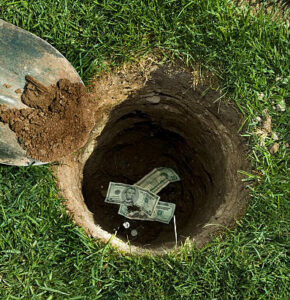Learn and document what you already have.
First work to become familiar with what is known. List out every account that you have, its location, the current balance, if and how it’s invested, and what the liquidity situation is like. This includes all of your personal 401(k)’s IRA, and other retirement accounts and pensions: as well as the account you hold jointly. Don’t forget to document the debts you share as well, get as close to a proper accounting of assets that you are aware of as possible. Year-end statements in a digital vault are a great way to do this.
You can’t protect what you don’t know is out there.
Then begin an effort to uncover the known-unknowns, this includes your spouse’s account you are aware of that exists but are unsure of the balance, the investments, the liquidity, and other details regarding their mobility and value. These accounts also include the balances in any operating business that might be involved. These accounts will be a little harder to uncover, but not impossible. Ballpark figures are good, but try to get as accurate of an understanding as possible. In most cases, a CFP® can help ask the right questions to uncover these details.
The hardest part will be documenting the unknown-unknowns. These are accounts you may not be aware of today. They require that you both find out about their existence and the requisite uses and balances. Because of the nature of these accounts, if you feel they may exist, you will almost certainly need a CFP® and/or a CPA® to uncover these details. Filing documents and tax returns might be the best place to start revealing the existence of these accounts.
Don’t ever hide money.
There is a lot of bad advice out there, and the first among them is to begin hiding money. From having a cash squirrel fund to offshore bank accounts, it’s not a good idea.

If you feel your spouse might not have your best interests at heart, documentation is the answer, not deception. Hiding money will more often than not have more damaging long-term consequences. You’re not a professional money launderer and there is almost always a paper trail. Regardless of the situation, there is almost always a better option if you are preparing for a divorce. In the months to come, these deceptive tactics that seem like a good idea now, become an assault on your credibility and may even escalate into more legal fees and costs. Ultimately, it may get back to the one person you absolutely don’t want to find out, the Judge in your case.
Do separate your bank accounts.
If you don’t have your own checking and savings account, get them now. You will need them for the long run and will want to start getting them set up now. If the money is held jointly, you can begin moving assets into your accounts for now. In some cases, there is a real concern that one party will get the idea to withdraw or spend down that account either in fear or as retribution. In either case, this is a bad idea and one you can mitigate the risk of by establishing your own financial ecosystem. If your spouse does decide to abruptly and possibly hostility, spend down the joint accounts, trust that this behavior can be identified by your counsel and the judge. And that in this situation your wish to isolate your portion of the funds was prudent and their behavior will likely be dealt with.
If you are concerned that the divorce will cause you an extended period of financial hardship, and with no access to money you may want to withdraw half the money into an individual account. Consult your attorney prior to the action, move the money, and immediately notify your soon-to-be-ex of what you’ve done. Transparency is key, and mitigating your risk is in your best interest.
Have your own emergency fund.
Clients that work with a CFP® should be familiar with the idea of an emergency fund. This will be your “divorce” emergency fund. It should be separate from any existing emergency fund you share. It may be the seed money

for your own personal, post-divorce, emergency fund in the long run, but for now, it is designed to save you from the compounding psychological, and emotional issues that accompany a divorce.
The fund should be a 2nd savings account with a singular goal, housing cash, and highly liquid assets that can be used to keep you in your house, make your car payments, and maintain your spending should a secondary event disrupt your personal cash flow. There are several scenarios we have witnessed that can cause a disruption in cash flow. From the broader economy to your employment situation, or even currently undiagnosed health issues. The idea is to not worry about the nature of the risk but to confirm that you are now financially ready for the unknowns that may arise.
You should be the only person with access to this fund. But you shouldn’t keep an account like this a secret. This is just quality financial advice that will persist through your divorce and into your new financial life post-divorce. It is freeing and financially sophisticated to know you have a risk management plan in place for the unforeseen in your future.
Build a team around YOU.
This might be a good opportunity to do your own vetting of an attorney, accountant, and financial planner for the divorce and into the future. Several of our clients have felt that in the marriage one of all of the above advisors was the result of the relationship they had with their spouse. This might be your best opportunity to build a more personal team that is prepared to represent your interests more acutely.
“Team You” should be composed of several professionals that you have personally selected for their responsiveness and professionalism regarding your specific situation. In most cases, this group will include your divorce attorney, a CPA®, and a CFP®. Additionally, we recommend at least in the throes of the divorce, including a mental health professional like a therapist or counselor, and possibly depending on the situation a forensic accountant, real estate professional, property manager, and business manager.
Put yourself at the center of this team, and use this window of opportunity to reinvent your professional advice ecosystem. Some of these professionals might persist long after the divorce, and some will only be valuable during the process. You’ll decide.
Do hire a divorce attorney.
There is a current ‘fad’ to work towards an amicable divorce. To avoid using an attorney to lower the costs and possible tensions in a divorce. I think this is a mistake, it often results in one party gaining the upper hand, and in many cases, one party is underprepared for the legal and strategic process that is about to unfold.
I don’t want to discount the desire to have a cordial and pleasant divorce experience, but what starts out as a mutually agreed-upon course of action will undoubtedly result in long-term pain, resentment, and even conflict. In many cases, efforts to appease and be amicable with your spouse result in long-term costs to one party that a legal professional might have better negotiated.
While you may not want a lawyer that causes hostility, having a professional negotiator in your corner pays dividends over the long term and results in a more clear, complete, and coordinated strategy for your personal wealth going forward.
Document the “little extras” in child support.
Child support can be tricky, hopefully, your attorney will help document and navigate this well. In any case, you should document the “extras” that often get overlooked. Child support is supposed to be the aggregate cost of the big and little purchases that go into maintaining the lifestyle of the child.
Usually, the big items, college savings, tutors and education costs, camps, and sports fees are all documented in the process. But too often small, inconsequential costs are overlooked. $25 for a school field trip, $50 for lacrosse stick, $8 for lunch at an away game are some of the point costs that are rarely accounted for properly and certainly add up over time.
Ideally, both parents will be in agreement that a child’s expenses aren’t static, and that routine accounting for these items are in the best interest of the child and promote a good environment post-divorce. Unfortunately in my experience these costs are forgotten about early in the process and felt more and more so as children get older and costs go up. This becomes a looming point of contention for many divorced adults.
Talk about the emotionality of the home.
Many people get emotionally attached to their home, it becomes the focal point for negotiations and for many families is the most valuable single asset and has very limited liquidity. Making it the most complicated asset. Additionally, there is a vocabulary that sneaks its way into divorce proceedings such as “win” and “lose”, “I lost the house in the divorce” is a common phrase we encounter.
At its root, the house is a major, singular asset. But upon further examination, people realize that while a house might be an asset, your home is more appropriately a liability. It requires insurance, maintenance, debt service, and may actually decline in value. So while in the process of a divorce it may be valued as a marital asset, one party might end up with a long-term liability that can deteriorate their finances post-divorce for decades. It is fair to argue that while the house has a market value today, that value needs to be discounted by the immediate liabilities that come with it, which are often overlooked in its valuation.
Our case is that a $500,000 house and $500,000 brokerage account might seem like equivalent assets. But the brokerage account can provide for immediate liquidity and cash flow, and the other carries tax liabilities, maintenance, and tax issues that deteriorate its actual value and causes a dislocation between the value of those assets over time.
Take a beat and write down “what is it about the house that is important to me” and then begin a process to determine if there is a more financially successful alternative. Often during the divorce, one party will overweight the value of keeping the kids in the same house, school, and community. They view the near-term disruption as harmful to the child but may be overlooking the likelihood of needing to sell a house down the road that is too costly for the single parent to financially support.
At worst this exercise will help you evaluate the financial and lifestyle alternatives available to you, at best it will be a good hard look at both the valuation of the house and the long-term viability of staying in it




